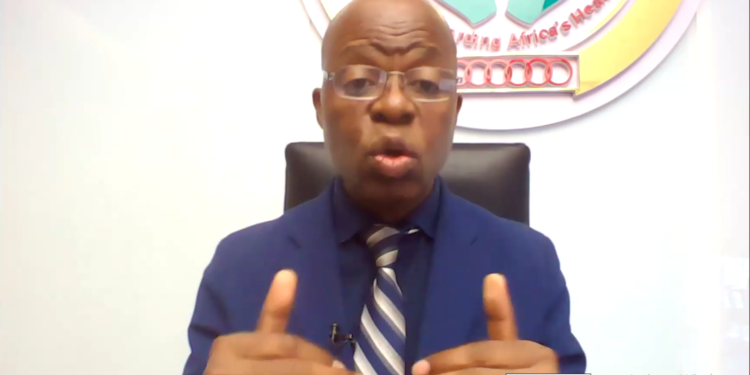By Kemo Cham
Inadequate funding rendered Sierra Leone incapable of dealing with Mpox, leading to the ongoing escalation of the virus in the country, an assessment by the Africa Centers for Disease Control and Prevention reveals.
The assessment conducted in April found that the country’s health system was overstretched and overcrowded, with grossly inadequate bed capacity to accommodate patients in Mpox treatment facilities.
There were only 60 beds available for 800 actives cases at the time of the assessment, Dr Ngashi Ngongo, Head of the Incident Management Support Team (IMST) at Africa CDC, said, noting that this posed a huge challenge with the self-isolation and home-based care policy of the government.
Dr Ngongo said the Africa CDC team found low isolation compliance rate, noting that people infected with the virus left their homes and attended social functions, thereby exposing other members of society.
“The most important thing is that funding is the main issue…because the system is weak,” said Dr Ngongo.
Consequently, latest data from the continental public health agency show that Sierra Leone is now driving the upward trend of positive cases of Mpox on the continent, at the top of the four most affected countries.
Sierra Leone, the Democratic Republic of Congo (DRC), Burundi and Uganda accounted for the largest number of cases as of last week, the data shows.
This Mpox epidemic began in mid-2023 and has since spread to over 22 countries, according to the Africa CDC data published during the agency’s weekly press briefing on Thursday, May 8.
With Burundi having put the spread of the virus under control, Sierra Leone, alongside DRC and Uganda contributed 90 percent of the cases in week 17, with Sierra Leone alone accounting for half of the total cases.
“Of great concern is that in just one week the number of notified cases have increased 71 percent and the number of confirmed cases have increased 61 percent. That is to say that it is really an epidemic that is on the upward trend,” Dr Ngongo, who is also the Chief of Staff of Africa CDC Director General, said.
Mpox is a viral infection that spreads through close contact and typically causes flu-like symptoms and pus-filled lesions.
The Africa CDC declared this epidemic a Public Health Emergency of Continental Security in August. The World Health Organization (WHO) followed suit in declaring it Public Health Emergency of International Concern in the same month.
Last month Africa CDC Director General Dr Jean Kaseya announced he had convened a meeting of the agency’s expert group to review the emergency status.
Sierra Leone was the last country in the Mano River region to fell to the Mpox epidemic, after confirming its first case on January 10th, 2025. That was followed immediately by the declaration of a Public Health Emergency. Minister of Health Dr Austin Demby said at the time that the move was necessary to prevent the virus from further spreading.
Officials however believe that this high number of cases is also an illustration of the effectiveness of the surveillance measures in place.
But the verdict of the Africa CDC assessment team is that even the country’s surveillance system was weak.
“Surveillance is mostly passive surveillance. That is why the positivity rate is far above 50 percent. It means that the people come when they are already very advance. They come on their own to seek (care), instead of active surveillance that can pick them early and shorten the exposure of the population,” he added.
There was also a visible weakness in the country’s capacity to identify and trace contacts for infected people, with only 764 contacts traced for 861 cases that had been confirmed. This, according to Ngongo, represented a ratio of less than one contact per confirmed case, as opposed to around 20 contacts per case.
Sierra Leone’s capacity for genomic sequencing was also found to be very low at 1 percent, whereas it should be 5 percent.
As of May 12, Sierra Leone had recorded 2,045 cumulative confirmed cases, with 1,641 active cases. All 16 districts of the country are now affected by Mpox, according to the National Public Health Agency (NPHA).
Authorities have expressed concern about the escalating cases as well as the severity of the cases due to the clad 2b strain that is circulating in the country.
The NPHA last week admitted that its strategy wasn’t working, and announced a series of new measures geared towards breaking the chain of transmission. They included ending home-based care and reintroduction of Ebola era regulations that enforce infection prevention control and social distancing in public places.
Prof. Foday Sahr, Executive Director of NPHA, told journalists at a press briefing on Thursday May 8th that public health inspectors might be deployed to monitor and possibly take action against defaulters.
“Failure to follow these rules may lead to fines, closure of premises and prosecution under the public health Act 2022,” he warned.
The NPHA also said it wold intensify its Operation Find Them All to identify, isolate and treat those who may be infected with the virus.
The government deployed Mpox vaccination in March, targeting health workers and contacts of infected persons.
Sierra Leone is one of 10 countries to have received vaccine supplies, thanks to support of partners like GAVI, UNICEF and the Africa CDC. But with a population of 8 million people and just a little over 61, 000 doses of the vaccines available, officials say those at highest risk will be prioritised.






















